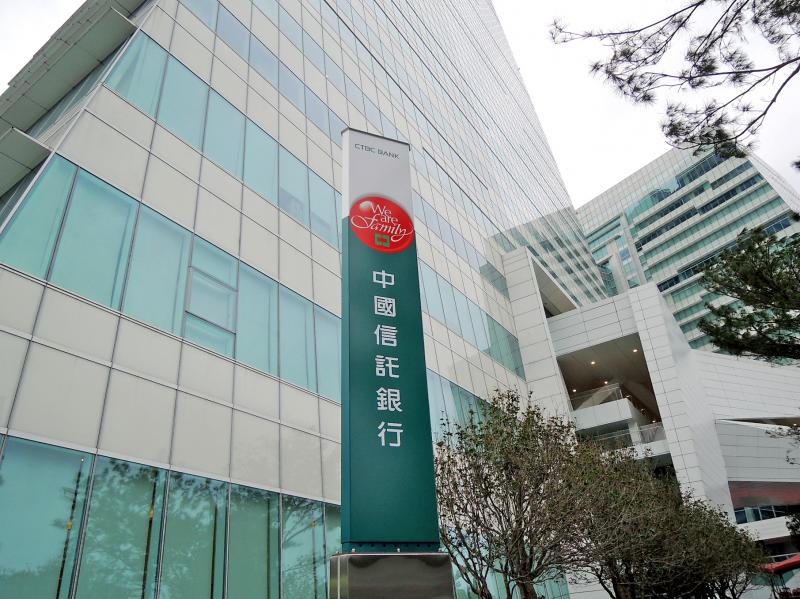Biodiversity loss is one of the top three risks in the next 10 years and would seriously affect future generations’ access to essential resources, the World Economic Forum said in The Global Risks Report 2022 last month.
For a long time, CTBC Financial Holding Co (中信金控) has focused on promoting the positive influence of the UN’s Sustainable Development Goals (SDGs).
As four of the 17 are closely related to nature (SDG 6, SDG 13, SDG 14 and SDG 15), and protecting and supporting biodiversity is the foundation of realizing a sustainable society, CTBC Financial on Monday last week became the first Taiwanese company to join the Taskforce on Nature-related Financial Disclosure (TNFD), aiming to work with more than 250 members around the world to contribute cross-disciplinary expertise and experience, and to develop a reporting framework.

Photo: Lee Chin-hui, Taipei Times
The TNFD was in June last year launched by an informal working group comprising 75 members, including the UN Environment Programme Finance Initiative, the UN Development Programme, the WWF, Global Canopy, Citi Group Inc, AXA SA, BNP Paribas SA, and other financial institutions, governments, think tanks and corporations.
Taking a cue from the successful experience of the Task Force on Climate-related Financial Disclosures (TCFD), the TNFD’s mission is to develop a disclosure framework for companies to report and act on nature-related risks, thereby supporting global capital markets to create positive value for nature.
CTBC Financial signed on to the TCFD in 2020, using the initiative’s framework to assess climate risk management and governance, as well as to promote low-carbon transformation in Taiwan and the Asia-Pacific region.
The company expects to reach a wider range of natural and ecological issues through participation in the TNFD.
In accordance with the TNFD, the company aims to strengthen the disclosure of nature-related risks and countermeasures from five aspects: governance, strategy, risk management, metrics and targets.
In addition, CTBC Financial is to continue to discuss with customers and encourage them to take positive actions to prevent related businesses from having a negative impact on the natural environment and fulfill corporate responsibilities of protecting the natural ecology.

Taiwan Semiconductor Manufacturing Co (TSMC, 台積電) last week recorded an increase in the number of shareholders to the highest in almost eight months, despite its share price falling 3.38 percent from the previous week, Taiwan Stock Exchange data released on Saturday showed. As of Friday, TSMC had 1.88 million shareholders, the most since the week of April 25 and an increase of 31,870 from the previous week, the data showed. The number of shareholders jumped despite a drop of NT$50 (US$1.59), or 3.38 percent, in TSMC’s share price from a week earlier to NT$1,430, as investors took profits from their earlier gains

In a high-security Shenzhen laboratory, Chinese scientists have built what Washington has spent years trying to prevent: a prototype of a machine capable of producing the cutting-edge semiconductor chips that power artificial intelligence (AI), smartphones and weapons central to Western military dominance, Reuters has learned. Completed early this year and undergoing testing, the prototype fills nearly an entire factory floor. It was built by a team of former engineers from Dutch semiconductor giant ASML who reverse-engineered the company’s extreme ultraviolet lithography (EUV) machines, according to two people with knowledge of the project. EUV machines sit at the heart of a technological Cold

Taiwan’s long-term economic competitiveness will hinge not only on national champions like Taiwan Semiconductor Manufacturing Co. (TSMC, 台積電) but also on the widespread adoption of artificial intelligence (AI) and other emerging technologies, a US-based scholar has said. At a lecture in Taipei on Tuesday, Jeffrey Ding, assistant professor of political science at the George Washington University and author of "Technology and the Rise of Great Powers," argued that historical experience shows that general-purpose technologies (GPTs) — such as electricity, computers and now AI — shape long-term economic advantages through their diffusion across the broader economy. "What really matters is not who pioneers

TAIWAN VALUE CHAIN: Foxtron is to fully own Luxgen following the transaction and it plans to launch a new electric model, the Foxtron Bria, in Taiwan next year Yulon Motor Co (裕隆汽車) yesterday said that its board of directors approved the disposal of its electric vehicle (EV) unit, Luxgen Motor Co (納智捷汽車), to Foxtron Vehicle Technologies Co (鴻華先進) for NT$787.6 million (US$24.98 million). Foxtron, a half-half joint venture between Yulon affiliate Hua-Chuang Automobile Information Technical Center Co (華創車電) and Hon Hai Precision Industry Co (鴻海精密), expects to wrap up the deal in the first quarter of next year. Foxtron would fully own Luxgen following the transaction, including five car distributing companies, outlets and all employees. The deal is subject to the approval of the Fair Trade Commission, Foxtron said. “Foxtron will be